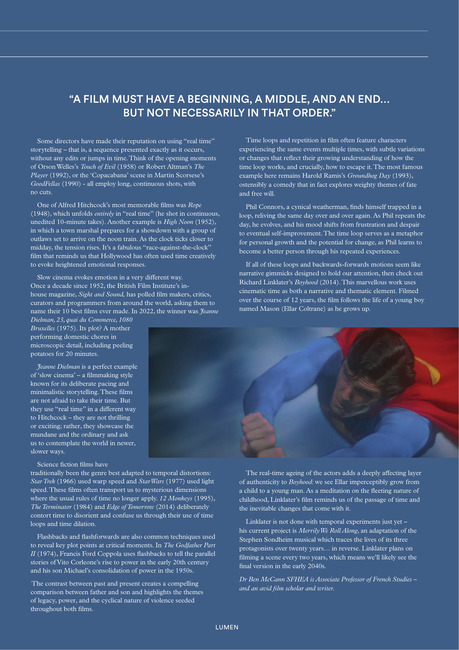Lumen Autumn 2025 - Flipbook - Page 36

Books
The backfire of time
“Quin had heard the shot. He told himself it was a gunshot/shotgun;
a backfire from which he was lucky enough to escape.”
the half light. He preferred not being
noticed since he received a private
satisfaction from depositing a missive into
a private box like a sneakthief taking his
pleasure from a sleeping girl by leaving
her a ring or a necklace stolen from
someone else.
The following excerpt is drawn
from a new work – Chinese
Postman – by illustrious literary
lion of the University, Brian Castro.
Appropriately for this timerelated issue of Lumen, the novel
examines the experiences of
older age, exploring the life of
Abraham Quin, in his midseventies, a migrant, thricedivorced former postman and
professor, now a writer living
alone in the Adelaide Hills.
He offers up memories and
anxieties, obsessions and
opinions, thoughts on solitude,
writing, friendship and time.
There is nothing much you can do to
ameliorate or euphemise the word
“gunshot”. You could do a lot with a word
like “shotgun”, used figuratively in phrases
like “shotgun wedding”, “shotgun shack”,
“he rode shotgun” etc. But “gunshot” only
emits peril and portent. Its report is totally
enveloped in time and that is what you told
the police. Back to front now, it wears a
jacket of time, cloaked by the night, its
crack no longer immediate in recall and as
I do not have a watch, I had no idea of what
aspect of the night had ushered me into that
menace of a gunshot; whether it was the
freezing cold, the incipient flurry of light
snow, the anticipation of joy.
But apart from all this drama which has
only accrued of late, Quin was normally
obsessed by tidiness, by spelling, by
rubbing off stains on the carpet. How
quickly it arrived, middle-age, then old-age.
He remembered his father’s shuffling gait;
not quite balanced; the earth also
shuffled; not quite balanced, and wild
with contingency.
It was as though, now that he was released
into the countryside doing nightshift
without a watch, it was as though he was
licensed to use verb tenses interchangeably.
But like his mother’s conjugations, there
was no future tense. He was free to deliver
mail in any order or on any specified route,
as long as all was done within twenty-four
hours. On daylight schedules he didn’t
hurry or try to get home early. There would
be long days when the sun had already gone
down and he would be trudging up the hills
with his bicycle, completing his duties as
cooking wafted out the windows of the
cottages, and sometimes a woman would
wave to him but not too often because she
was often too busy with cooking or children
to notice him fiddling with her letter-box in
36
I only ever waved back to one of them.
It was by coincidence that I had not only
seen her up in the hills but had met her in
the city and then there she was now, looking
very pretty, a month before what I will call
the Lookout Incident. I remember that day
well. In the art gallery in town, I had seen
myself in the glass doors like an installation,
my father looking back at me, his eyes
squinting against the glare just before he
died into the light. I remember him saying
that death was the only deadline for a
journalist. As a journalist he trained himself
to notice things with the instincts of a
policeman, mainly about people. But he
did not seem to care about what was on the
periphery... a particular tree, the light in the
late afternoon, peculiarities of feeling.
He did not know that the key to
understanding anxiety was to realise one
was missing something loved and longed-for
like home, because as a journalist he subedited emotions and was often disappointed
that the homeless realities he pursued did
not fit. He moved on, like I did that day,
wandering into the labyrinthine alleys of
cafés and cannabis. I noticed the librarian’s
wife working in one of them, and when I
waved, she beckoned me to enter, asking if
I had a day off, to which I replied that it was
a postman’s holiday. I should have said it
in French if she had been French (though
I found out later that she was Ukrainian),
that I was un facteur en balade and with that
waltzing ballad upon my lips ordered a













